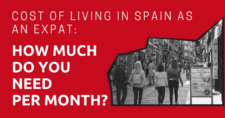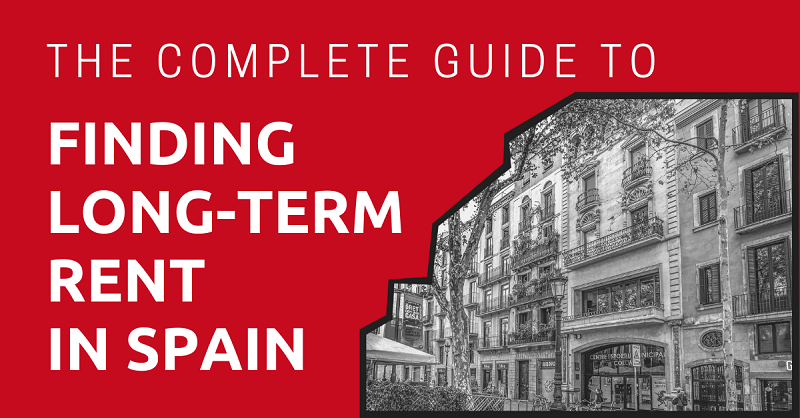
If you are reading this article, chances are, you are someone who’s seriously considering moving to Spain.
As someone who has spent five years living in Barcelona, I am always excited for anyone who is moving to this southern part of Europe. Spain is an excellent place to live. However, from my experience, finding an apartment can be a struggle.
Many expats say that they wish someone had explained to them the rental process in Spain prior to their move. That way, they would have saved time and money.
This guide will help you find an ideal place to rent. It will give you practical information so you won’t feel lost while finding a place to rent long-term. You will also learn a few little-known information about Spanish realty.
This article will take approximately 30 minutes to read. Don't have the time right now? No worries. You can email the ad-free version of the article to yourself and read it later!
Disclaimer: This article may include links to products or services offered by ExpatDen’s partners, which give us commissions when you click on them. Although this may influence how they appear in the text, we only recommend solutions that we would use in your situation. Read more in our Advertising Disclosure.
Contents
- Things to Keep in Mind When Looking for a Rental
- How to Rent an Apartment Without Being Scammed?
- Financial Considerations
- Finding Apartments
- Types of Accommodations
- Location
- Rental Leases
- Checklist: Before Renting an Apartment
- Obligations and Rights of the Tenant and Landlord
- Renting vs. Buying
- Finding Temporary Accommodation
- Now, on to you
Things to Keep in Mind When Looking for a Rental
First, know that it’s necessary to be open-minded and patient when you are moving to another country with a different culture. Many people feel overwhelmed after relocating because of cultural differences.
If you’re moving on your own — that is, without friends or family in Spain — getting an idea of how life might look in the new place can be hugely beneficial.
Renting an accommodation is one of the most exhausting experiences because of local laws, cultural differences, and language barrier. These aspects can slow you down in finding the right place. This is why you should take time to learn about any given location, which we hope this article can help you with.
But first, you need to learn crucial information about Spanish culture and language.
Language
You may be wondering, “Do I need to speak Spanish to rent an apartment in Spain?”
No, but in most cases, landlords who are seniors will most likely prefer to communicate only in Spanish.
Spaniards are generally known to prefer to speak their own language, although more and more locals in large Spanish cities are okay with communicating in English. However, it may still be difficult to find a landlord who can speak English well enough that you can strike a good deal when negotiating with them.
Needless to say, being able to communicate smoothly with a landlord is crucial when negotiating, signing a contract, and discussing the conditions of the apartment. If you have poor Spanish speaking skills, you’d be better off finding an agent who can speak Spanish, or asking a native speaker for help. Still, you must remain cognizant when negotiating and when you’re about to sign any document.
I moved to Spain knowing only basic Spanish, and I can tell you that learning practical vocabulary can be invaluable.
Take note of the following words as these will come in handy.
- Alquiler – rent
- Propietario or Arrendador – landlord
- Arrendatario – tenant
- Piso – apartment and/or floor
- Dormitorio – bedroom
- Habitaciones – rooms
- Salon – living room
- Cocina – kitchen
- Gastos – costs
- Calefacción – heating
- Fianza – deposit
- Ascensor – elevator
Learning the address details can also be challenging. If you live in a compound building, you may need to specify your home address by mentioning Escalera, Piso, and Puerta. Escalera means stairs, while buildings can have various escaleras (staircases).
When indicating your address, you also have to specify the Piso, or floor number. Puerta means door, and when writing an address, the number of the door must also be indicated. Your address details in Spanish may look something like this: Escalera 3, Piso 7, Puerta 2. If you don’t include all the details of your address, people may not be able to find your home.
Culture
You will learn soon enough that cultural differences become apparent when you negotiate rental prices with landlords. Aside from that, you must also take some time to learn the structure and names of the buildings and apartments in Spain.
For example, a one-bedroom apartment in Spain contains a living room and bedroom. That is considered a two-bedroom apartment in other countries. The definition of the floors might be different, as well. In old Spanish buildings, you will see floor names referred to as follows:
- Bajos or Planta Baja – ground floor (street level)
- Entresuelo – the actual first floor; it is between Bajos and Principal
- Principal – second floor
- Primero – third floor
- Segundo, Tercero, Quarto – actual fourth, fifth, sixth, seventh floors
- Atico – top floor
It’s worth noting that Spanish landlords are extremely careful with choosing people to whom they will rent out an apartment. This is because the economic crisis in Spain caused many people to have trouble paying rent, which made them extra-cautious.
So that they can be 100% sure that rent will be paid, landlords require tenants to provide documentation about their financial situation.
You might also notice the general indifference of agents and owners. Big cities are full of people looking for an apartment; if you don’t get a particular place, it can easily go to someone else. You may even feel as if you are not merely looking for a flat but hunting for one.
Negotiation is common in Spain, so I recommend negotiating rental prices. Nevertheless, it can be a touchy subject, so try to be judicious when negotiating — for instance, you should avoid asking for more than a 10% price drop. There’s almost always a way to meet somewhere in the middle.
Ultimately, it can be daunting to find a reasonably priced, high-quality apartment due to the high demand for apartments in Spain.
Seasonal Price Fluctuation
If you’re looking for rental price drops, it’s best to look during winter as it is an off-peak season for renting an apartment in Spain. By contrast, the summer is when the locals actively look for an apartment and when prices tend to be higher.
Graduate students usually start to look for accommodations in the summer, and many working people use their holidays to find an apartment.
Tourism and Nightlife
Remember that Spain is a popular tourist destination. You’ll notice a substantial difference between being a tourist and being a resident in a city like Barcelona. You would certainly want to avoid living in a tourist area, primarily because rent tends to be overpriced and the cost of living expensive.
For one, food prices in tourist areas are high compared to those in non-tourist areas. Also, tourist areas are noisy as large tourist crowds tend to cause too much noise at night.
I recommend asking around neighborhoods regarding the noise level at night. Observe the surroundings of the area where you might choose to rent. It’s often the case that the cost of renting an apartment situated in city centers is high, but the quality of living is low.
Families
Moving to another country with children is much more complicated than moving alone. So if you’re apartment-hunting in Spain, it may take much longer if you’re moving with children.
I suggest arranging short-term accommodations upon arrival and looking for a long-term rental once you’ve settled. Staying at an apartment for a temporary stay is often more sensible if you have children with you.
Do some research on different districts. When searching for an accommodation, take into consideration nearby schools and kindergartens. In any case, you will want to avoid living in unsafe areas despite their proximity to public schools.
Do not sign anything without having visited the apartment.
Special Needs Building
In 2019, a Human Rights Watch article criticized Spain for its inaccessible buildings and a lack of support services for the disabled and the elderly. For one, many old buildings in Spain have no elevators. Because of this and other safety reasons, people with special needs should look for an apartment building that’s handicap accessible, preferably located in an area where shops and pharmacies are close by.
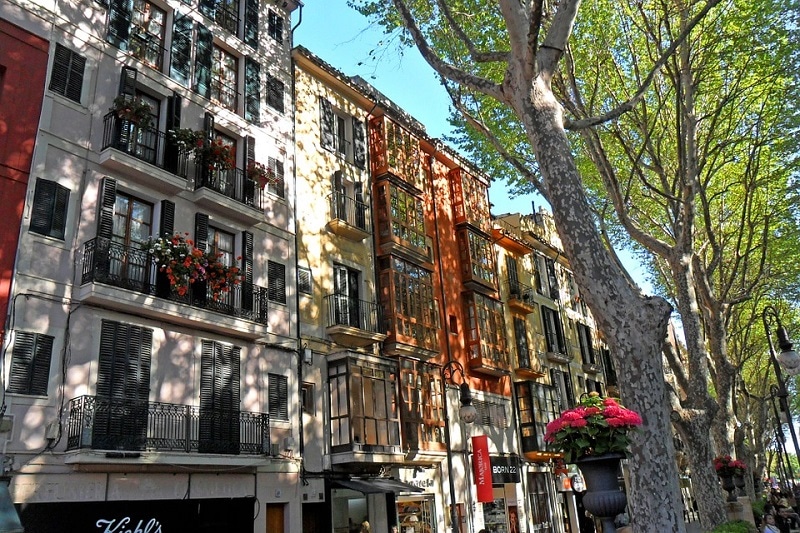
Pets
Spaniards love their pets, and this can be seen in the increasing number of pet-friendly places in different parts of the country. Despite that, it is common for landlords to prohibit pets in their properties. They are concerned that pets may cause damage to their house. So ask landlords about pet policies in the apartment on your initial meeting if you’re moving in with a pet or pets.
Otherwise, when signing a contract, you may find a clause prohibiting the possession of pets in rented property. I recommend negotiating with your landlord about this. Express a will to cover the expenses in case of any damage.
Another consequence that you might face is your pet causing nuisance to the neighbors. The landlord may end the contract if the neighbors complain.
To know your rights and laws pertaining to possessing pets in your rented house, I urge you to read the article Pets and rental properties in Spain for a more detailed overview.
How to Rent an Apartment Without Being Scammed?
Recently, more and more fraudulent rental ads have proliferated, deceiving apartment seekers with non-existent homes. Although it can happen at any time of the year, it is rampant during peak season. It is crucial to remain vigilant so as not to become a victim of fraud.
When looking for an apartment, take extra precaution and watch out for red flags. In particular, you should:
- Be cautious of houses being rented out at suspiciously low prices. If rent price is too low, compare the prices of houses being rented out in a particular area.
- Be skeptical if you find out that photos of a specific apartment appear on another property website.
- Do not trust landlords who say they live abroad, and for some reason, can not show you the apartment in person.
- Be cautious if they suggest using intermediaries to deliver the keys or sign the contract.
- Watch out for landlords or agents who rush you to agree to a deal. Fraudsters are always in a hurry to close a deal.
- Be wary if you get asked to make payments through money transfer services such as MoneyGram or Western Union.
You can always verify the identity of the person who claims to be the owner by requesting their information on the National Property Registry website. Simply visit the site and look into the property’s information, specifically the legal status of the property including its description, owner, and relevant charges, if any.
If you want to avoid becoming a victim of online scams, do not pay for anything without seeing the apartment and sign the contract only with a landlord, property manager, or real estate agent present.
Otherwise, you could find out that you have rented an apartment in different conditions than was advertised, or worse, that the property does not even exist.
You should never pay any amount of money or sign a contract without first personally inspecting the condition, the location, and the number of rooms of the apartment.
Financial Considerations
The question foremost on many people’s mind is, “Is it expensive to rent an apartment in Spain?” But there is no definite answer to this question.
Whether renting an apartment in Spain is expensive mostly depends on what you perceive is a reasonable price for renting a house and what the average rental costs are in your home country. There are also many other factors that can affect the costs of rent.
You also need to take into consideration factors such as which part of Spain you’d like to live — do you want to live in a big city or suburbs?
For more detailed information on the cost of living in Spain, read this comprehensive guide: Cost of Living in Spain as an Expat: How Much Do You Need Per Month?
When planning to relocate, it is important to look carefully into your budget. Aside from rent, consider other expenses such as:
- The cost of hiring a real estate agency (either for a fixed, long-term rate or one-month rent)
- Deposit fees (usually two months’ rent)
- First-month fee
- Costs of your temporary accommodations
There might be other unexpected costs too like furniture-related expenses or transport agency costs.
Landlords in Spain base the rental prices on total square meters, or metros construidos. “Total” is a keyword here, as it might include the space within the perimeter and square meters of the shared common area.
In fact, it may surprise you that a flat consisting of 100 meters is in reality much smaller. You can ask the landlord to give you a more accurate estimate, and ask for the usable square meters or metros útiles.
Finding Apartments
Depending on the reason of your stay in Spain, you may choose either short- or long-term accommodation.
Renting an apartment short-term is a good option as you look for a place to rent long-term. You can search for short-term apartment rentals at sites like Booking.com or Airbnb.
If you’re renting for a long-term stay, be more discerning and critical so you can make sure you’re renting a house where you can be safe and comfortable.
Using Agents or Owners
To rent an apartment, you can approach either a rental agent or landlord. Both options have their cons and pros.
Rental agents are professionals when it comes to dealing with paperwork and any issue, which tend to appear after a contract has already been signed. Agents will also present a portfolio of apartments, which they’ve customized based on your needs and budget.
However, renting through an agent entails an initial extra cost of one month rent, while some agencies might charge their own fixed rate. Note that a real estate agent may ask you to present a bank statement or employment contract.
If you rent by directly approaching a landlord, one immense advantage is fewer costs. First, you will save up to two months’ rent. It is also easier to agree on rent when you negotiate, but sorting out paperwork can be tricky when there is no intermediary. One setback is that formalizing an agreement can take longer. And there’s no guarantee that the landlord will comply with the agreement.
Looking Online
Do some research on the country’s rental market before you go. It will help you understand the price range, districts, and the standards of different kinds of flats.
These websites can be very useful for foreigners looking for an apartment in Spain:
- Idealista is user-friendly and offers over 1.6 million apartment ads. You can view the site in English, French, German, Italian, Russian, Chinese, and other languages.
- Fotocasa is a real estate portal in Spain with ads for around 1.5 million second-hand properties, new construction developments, and rental homes. The site can be viewed in English and German languages.
- Habitaclia has ads for 120,313 rental apartments. The site can be viewed in English, French, German, and Italian.
You can also find real estate agencies’ portfolio on these websites such as Engel and Voelker, which offers real estate services worldwide.
Types of Accommodations
You will find a variety of houses in Spain: studio, apartment, duplex, penthouse, etc.
A studio is a type of apartment with a single room. This type of housing is affordable and ideal for one person. You can rent a studio unit in a big city for less than 1,000 euros.
In Spain, the word “apartamento” means a flat with one bedroom — not to be confused with the English word “apartment,” which can refer to a set of living spaces. A one-bedroom flat typically measures 40-50 square meters and is a good option for couples and solo dwellers. It’s not too difficult to clean and maintain.
To find more spacious accommodation, you need to use the word “piso” in your search. You can find a more spacious flat mostly in new modern buildings (often comes with parking) or in old-fashioned buildings, ones with a stunning entrance hall, large windows, and high ceilings.
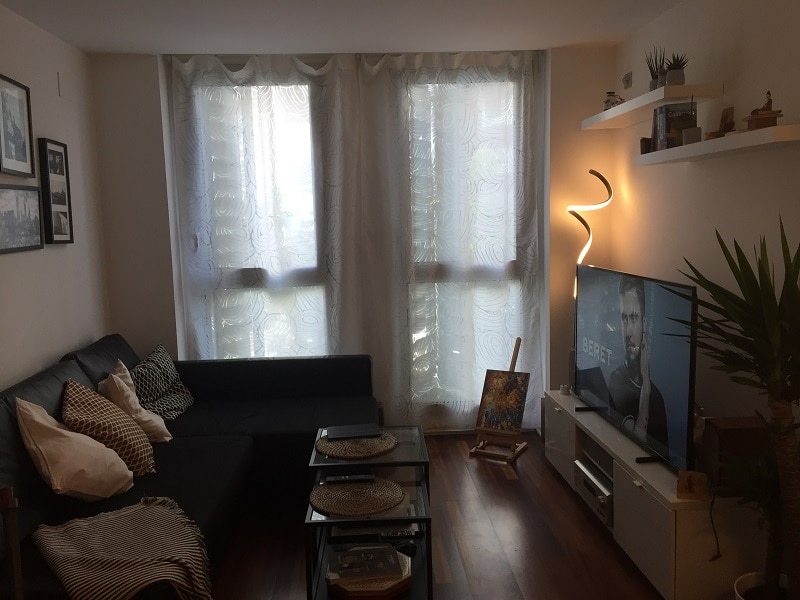
These old-style buildings in Spain are attractive and elegant, but they tend to have poor water pressure and few electrical outlets. Keep in mind that old buildings rarely have elevators or parking.
The most popular choice is a duplex or penthouse apartment. A duplex has two floors; the kitchen, living room, and common areas are on the lower floor, while the bedrooms are on the upper floor.
Penthouses or “aticos” are on the top floor of a building and usually has sweeping views, ample terraces, and plenty of natural lighting. Naturally, they tend to be high priced.
A house will be a suitable option for families with kids particularly for those who decide to settle in smaller towns.
Location
Location is the most important factor in the cost of rent.
Rent prices vary depending on which zone in Spain you want to live. You can refer to this article about the cost of living in Spain to get an idea of rent prices in different regions.
Rent prices in the north region are more expensive than in the south. Therefore, you can expect to pay higher rent in Bilbao than in Sevilla. Renting a place that’s located near the sea can also hike up rent prices. Generally, houses in seaside towns tend to have higher rental prices.
Consider human settlements, too. It costs less to live in a small town costs than in a large city.
Finally, if you decide to settle in big cities, prices will vary per district. Rent prices in city centers are higher than in suburbs. The higher prices in cities has to do with the location’s perceived prestige.
Rental Leases
Note that for long-term rentals in Spain, contracts are usually made for at least 12 months. So if you want to move out earlier, you will need to pay the rent until the end period as stated in the contract. You can try to negotiate with the landlord if you wish to get out of the contract.
Hiring an experienced real estate agent or seeking legal advice can help, as agents and/or lawyers can look into the contract and other documents and suggest a workaround.
If you prefer not to hire an agent, you can look into rental regulations in Spain yourself (the site is in Spanish, fyi).
Necessary Documents
A landlord or agent will most likely ask you to provide the following documents:
- A document or an evidence showing your ability to pay rent (e.g., employment contract, last three months’ payslips, bank account statement)
- Passport or ID
- Tax identification number or NIE (Número de Identificación de Extranjero)
As a foreigner in Spain, you need to be able to prove that you can pay rent. If you are a citizen of the EU, your passport or ID will be sufficient. If you’re a non-EU citizen, they’ll ask you to show a valid visa or residence permit.
The tax identification number is crucial. Many landlords will not rent out an apartment if you don’t have an NIE, even if you have no financial difficulties. They require this document as proof that you won’t be leaving the country any time soon.
Some landlords may ask you to provide character references, but this is rare.
Contract
A verbal or written rental agreement (Contrato de arrendamiento) is considered valid in Spain. A written agreement is unquestionably more reliable and binding.
Both parties typically agree as to the duration of the contract. However, the new rental regulation implemented in March 2019 mandates that if a contract has no specific date, the tenant can extend the lease to five years. The tenant may be allowed to extend it after one year of living on the property. After this period, if either party does not wish to end the contract, it will automatically be extended to a maximum of three years.
It’s important that you know how to identify the elements in a contract. A contract must specify who the contracting parties are: the landlord and the tenant. It must also include the characteristics and features of the home to be rented: address, surface area, parking slot allocation, etc.
If you find clauses in the contract that are unclear to you, seek legal advice. I recommend referring to this checklist of necessary details when reading a contract:
- The parties involved
- Information on the property (address, surface, etc.)
- Characteristics of the house
- Contract period
- Monthly fee
- Deposit and its refund
- Termination of the contract (notice, conditions)
- Housing inventory
- Photos of the flat
Of course it’s also crucial to verify the identity of the landlord. You can do this through the website of the National Property Registry.
The landlord should mention the annual increments in the contract. If it’s not stated, bear in mind that the amount should not be higher than the annual consumer price index rate (IPC).
There are two ways of paying the rent: directly to the landlord or to the agency, depending on whether they have an agreement regarding rent payment. This should also be stated in the contract.
Deposit
In Spain, “la fianza” deposit (security deposit) cannot exceed two months’ rent.
Once the landlord collects it from you, he must deposit it with the corresponding public body of the region until the lease expires. In Madrid, for example, they deposit it in Instituto de la Vivienda de Madrid (IVIMA).
The landlord needs to present proof of the deposit at the IVIMA with a copy of the lease. Once the lease ends, the landlord will have to return the deposit to the tenant. To do this, he must request a refund from this public body.
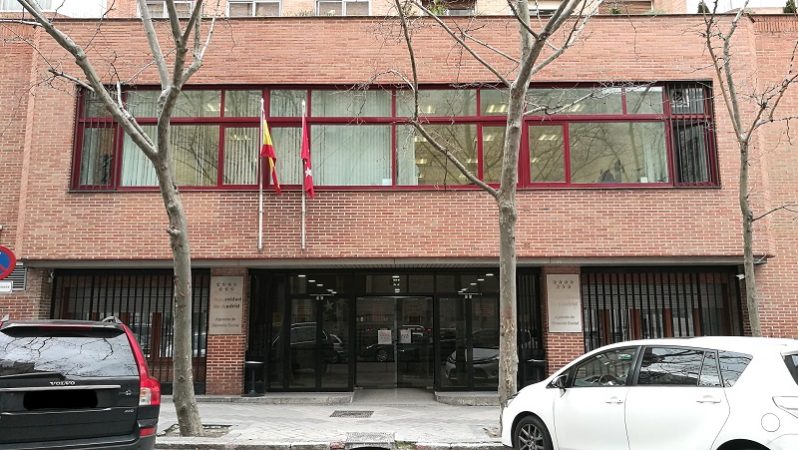
Request a receipt of the “fianza” to avoid any confusion.
However, some landlords tend not to return the deposit to the tenants. To ensure that you get your deposit back, make monthly payments on time, properly communicate any damages to the property and be amenable to reasonable solutions to fix them, and when you’re leaving the flat, leave it spotless and pay all final bills.
There is also an unofficial rule that the landlord might request a two-month deposit for a furnished flat and one month for unfurnished. This rule does not apply in all cases.
Economic Solvency
One of the typical requirements in Spain is proof of sufficient funds to cover your rent. Without this, the landlord will most likely not rent out the property to you. They need a guarantee that you can pay the rent.
To prove your economic solvency, you need to provide:
- Your income statements or invoices if you are self-employed
- An employment contract and last two payslips if you are a company employee
Bank account
To pay monthly rental fees together with utility bills, you’ll need to open a Spanish bank account.
This is to avoid having to pay bank fees for international transfers in case you’re paying using a non-Spanish bank account. To make monthly payments for utilities like water or gas, there’s an option to have payments directly debited from your Spanish bank account.
To open a bank account, you’ll need to provide an ID, NIE number, address in Spain, and proof of employment status.
For more information, you can read the article “Opening a Bank Account in Spain: A Guide for Expats and Tourists”.
Notice Period
To terminate a contract, a tenant must provide a minimum of 30 days’ notice, ideally after at least six months have passed. This should be indicated in the contract. In instances where either party fails to commit to the terms stated in the contract, they can agree to end it earlier than agreed.
Furniture
If there are furniture in the flat, the landlord should indicate it in the contract. Landlords should provide you with a list of items in the flat, including descriptions of the items’ conditions.
When you’re inspecting the place, verify that the information in the inventory list is correct. I recommend taking photos as these might come in handy in case an issue arises when you’re about to claim the deposit.
Utilities
As a new tenant, it is your responsibility to apply for new contracts from service providers for utilities like electricity, gas, water, and internet.
Landlords must provide you with a legal document called “cédula de habitabilidad” to enable you to enter into an agreement with these service providers.
Most houses in Spain do not have centralized heating, and you’ll find that heating is a luxury utility. Heating is not an issue during long Spanish summers, but it can get chilly in winter. So ask if a flat has an air conditioner with both hot and cold air capabilities.
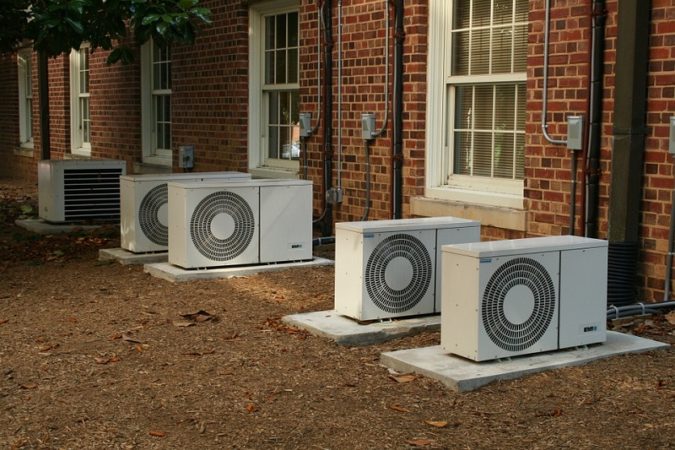
Also, AC will be a very convenient option for particularly hot summers, especially if you live in “aticos” or top floors. The new modern buildings often have AC installed in their apartments.
And read and review contracts carefully. Check if there are any additional costs for utilities that the landlord wants you to cover.
Maintenance
Tenants must repair any damage that did not occur naturally. That said, landlords should see to it that the property is in a good condition and fit for habitation, to begin with. I recommended keeping the receipts of all costs you’ve incurred to repair damages.
Checklist: Before Renting an Apartment
Once you found an apartment for rent, take photos and videos and check all the facilities. If possible, visit the apartment at different hours. Check the neighbors, and if there is a concierge, find an opportunity to talk to them.
Here are a couple more things to do in the house before you finalize the rental application process:
- Check if the door cylinder and the keys are working.
- Check if the doorbell and door phone are working.
- Check if the doors and windows open and close properly.
- Check if there is hot water and if the toilet and shower work.
- Check the condition of the furniture, floors, walls, and ceilings, especially those in the kitchen and bathrooms.
- Check the lights.
- Ask the landlord to show you how utilities — including electricity, water, and gas — are set up. Also ask about the instructions on how to use and/or maintain the appliances provided.
- Pay attention to noises, whether they occur inside or outside (neighbors, animals, traffic, bars, etc.) the house
Check out the community in the apartment building or neighborhood. In Spain, homeowners associations are quite common in apartment buildings. They hold monthly meetings to discuss matters concerning the apartment building. You don’t need to participate; it’s the landlord’s obligation. What you can do instead is get to know the association president, so you know who to approach in case an issue arises.
You might also want to ask the landlord about homeowners association fees. The landlord usually pays for it, but it’s worth verifying this information (which should also be included in the lease contract).
Lastly, learn about the facilities in the apartment building. Check if the building has a functioning elevator, is well-lit, and if the facilities are well-maintained so you’ll know if they can be used. Many apartment buildings have insurance that covers claims related to leaks, fixes, etc. You can ask the landlord about this.
Obligations and Rights of the Tenant and Landlord
As a tenant, you should know your obligations, which typically include the following:
- Keep the apartment and the facilities in good condition. If something breaks, do not attempt to fix it without consulting the landlord first.
- Pay rent on time. Otherwise, the landlord may break the contract.
- Respect your neighbors.
- Do not rent out the entire apartment or any of its rooms if you don’t have your landlord’s permission to do so. As a general rule, landlords do not permit subletting.
As a tenant, you have the right:
- To recover the deposit. If you left the apartment in good condition, the landlord must refund the entire deposit.
Renting vs. Buying
If you have plans to move to Spain permanently, you might want to consider buying a property.
Note that there are pros and cons to both renting and buying. If you decide to buy, you need to be 100% sure because it entails a long-term commitment. On the other hand, renting gives you the advantage of being able to easily move out; if you don’t like the place anymore, you can always look for another one.
That said, buying an apartment by taking out a mortgage could be cheaper than renting one.
In Spain, there’s an option to rent an apartment with the possibility of buying it. With this option, the owner could deduct the rent payments from the price of the property. However, there are risks to this option.
In case the housing market drops after the purchase contract has been formalized, the price of the property would be higher than the market price.
Finding Temporary Accommodation
If you plan to live in the country for less than a year, consider a short-term rental. For this, you would need to sign a seasonal rent contract (“contrato de arrendamiento de temporada”), which is usually valid up to one year and has different terms than a long-term contract.
Unlike a long-term contract, the seasonal contract has less legal protection. For instance, if you stay for less than six months and want to end the contract, you might have to pay for the remaining months of the year. After six months have passed, you can terminate the agreement provided you give 30 days’ notice.
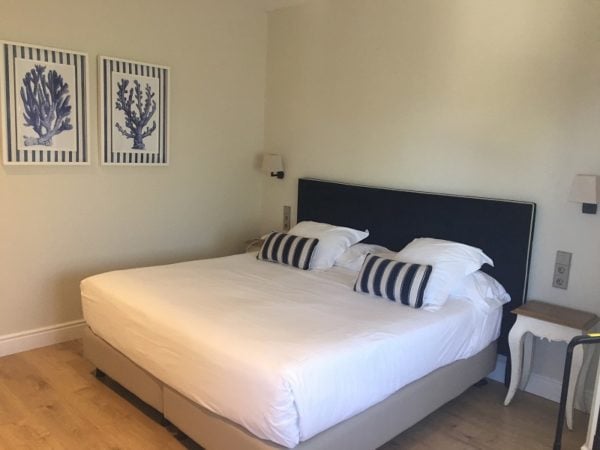
Short-term rental flats usually have furniture, which means you don’t need to sort out paperwork regarding belongings.
If you need to find a short-term rental while looking for permanent accommodation, you can have a look at Booking.com or Trivago for good deals.
Booking.com offers options for flats or hotels. If you prefer cooking at home, renting an apartment is a better option. Another option for short-term rentals is Airbnb where you can find cozy and affordable places.
Remember to check the district where you will stay, even if it’s just for a short-term stay. Consider asking locals about which zones in the city are safe and convenient to live in.
Now, on to you
When preparing for apartment hunting, write down your home must-haves, evaluate your budget, and look into different neighborhoods or districts.
After living in Spain for years, I’ve become familiar with the different stages of finding a good apartment in the country. I’ve gained quite a bit of expertise, so here are a few more final tips from me:
- Create a list of pros and cons of your choices. Suppose you’ve narrowed down your choices between living in a quiet area (with a peaceful neighborhood) or a busy and noisy area (but one that’s near a metro station), having a list of pros and cons will help you easily see which option has more pros in it, which will then help you decide based on what you value more in an apartment.
- Prepare your documents in advance. Once you find an apartment that you like, having all the necessary documents ready reduces the likelihood that the apartment you want will get rented out to someone else.
- When in doubt, seek legal advice.
- Take photos and/or record videos of the place you’re renting, particularly the conditions of the furniture and facilities.
- Don’t forget insurance — in case of any damage to the property, insurance will be your friend.
- To get your deposit back, keep a record of all receipts from home repairs.

